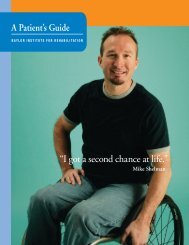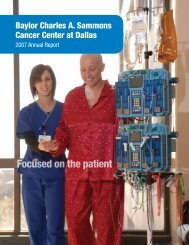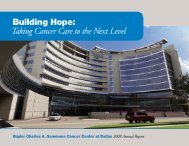McKinney - Baylor Online Newsroom - Baylor Health Care System
McKinney - Baylor Online Newsroom - Baylor Health Care System
McKinney - Baylor Online Newsroom - Baylor Health Care System
Create successful ePaper yourself
Turn your PDF publications into a flip-book with our unique Google optimized e-Paper software.
Decades of Research and ResultsNearly 20 years of study is revealing important information about colorectal cancerAN ONGOING RESEARCH STUDY at<strong>Baylor</strong> has already made importantdiscoveries about hereditary colorectalcancer. And as the project heads intoits 18th year, researchers are focusedon better identifying people at thehighest risk.Led by C. Richard Boland, MD,chief of gastroenterology for the GICancer Research Laboratory at <strong>Baylor</strong>Research Institute and a physician onthe medical staff at <strong>Baylor</strong> UniversityMedical Center at Dallas, the projectrecently had its funding renewed bythe National Institutes of <strong>Health</strong>, whichhas helped fund the entire project.“It’s unusual to have a grant renewedas many times as ours has been,”Dr. Boland says. “You really have todemonstrate that there’s value incontinuing the research.”The study began by looking athereditary nonpolyposis colorectalcancer, an inherited form of thedisease that affects only about3 percent of people with colorectalcancer. After the genetic basis ofthe disease was discovered, it wasrenamed “Lynch syndrome.”Early on, researchers made apivotal discovery. They developed anexperimental model that permittedthe nature of Lynch syndrome to bestudied in detail, and they found thatthe mutations responsible for thedisease were also involved in regulatingcell proliferation. Eventually theyrealized that Lynch syndrome tumorsprobably wouldn’t respond as expectedto chemotherapy, which was laterconfirmed in clinical studies.The research has since expandedto include other types of familialHow to Get InvolvedParticipants for this study are selectedthrough physician referrals, so talk toyour doctor if you think you might be acandidate. To learn about other researchtrials at <strong>Baylor</strong> seeking participants, visit<strong>Baylor</strong><strong>Health</strong>.com/advancingMedicine.colorectal cancer that aren’t caused bythe DNA defect. Researchers also wantto determine whether there’s a geneticcause of colorectal cancers that formin young people.As researchers continue studyingcolorectal cancer, they’re also lookingfor tumor markers that can betteridentify the exact nature of the tumor.Ultimately, Dr. Boland says, thegoal is to develop ways of predictingwhether people are at high risk fordeveloping cancer, whether the canceris likely to recur and if the tumorsmight respond to chemotherapy orother treatments.“The goal of the research is tostratify people into those at highestrisk—who should get colonoscopies,and maybe more frequently—and thosewho are never going to get colorectalcancer,” he says. “If the results ofthe research could relieve a portionof the population from the need fora colonoscopy, I think many peoplewould see that as a heroic discovery.”10 <strong>Baylor</strong><strong>Health</strong>.com

















